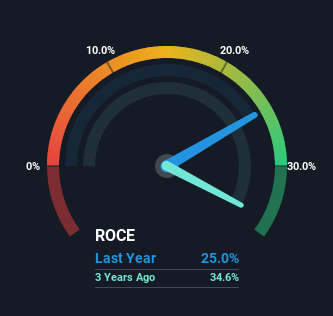- India
- /
- Healthcare Services
- /
- NSEI:REMUS
Returns On Capital Signal Tricky Times Ahead For Remus Pharmaceuticals (NSE:REMUS)

What trends should we look for it we want to identify stocks that can multiply in value over the long term? Ideally, a business will show two trends; firstly a growing return on capital employed (ROCE) and secondly, an increasing amount of capital employed. Ultimately, this demonstrates that it's a business that is reinvesting profits at increasing rates of return. Having said that, while the ROCE is currently high for Remus Pharmaceuticals (NSE:REMUS), we aren't jumping out of our chairs because returns are decreasing.
Return On Capital Employed (ROCE): What Is It?
Just to clarify if you're unsure, ROCE is a metric for evaluating how much pre-tax income (in percentage terms) a company earns on the capital invested in its business. Analysts use this formula to calculate it for Remus Pharmaceuticals:
Return on Capital Employed = Earnings Before Interest and Tax (EBIT) ÷ (Total Assets - Current Liabilities)
0.25 = ₹269m ÷ (₹2.6b - ₹1.5b) (Based on the trailing twelve months to March 2024).
So, Remus Pharmaceuticals has an ROCE of 25%. That's a fantastic return and not only that, it outpaces the average of 14% earned by companies in a similar industry.
Check out our latest analysis for Remus Pharmaceuticals

While the past is not representative of the future, it can be helpful to know how a company has performed historically, which is why we have this chart above. If you're interested in investigating Remus Pharmaceuticals' past further, check out this free graph covering Remus Pharmaceuticals' past earnings, revenue and cash flow.
What The Trend Of ROCE Can Tell Us
On the surface, the trend of ROCE at Remus Pharmaceuticals doesn't inspire confidence. To be more specific, while the ROCE is still high, it's fallen from 39% where it was four years ago. Although, given both revenue and the amount of assets employed in the business have increased, it could suggest the company is investing in growth, and the extra capital has led to a short-term reduction in ROCE. And if the increased capital generates additional returns, the business, and thus shareholders, will benefit in the long run.
On a separate but related note, it's important to know that Remus Pharmaceuticals has a current liabilities to total assets ratio of 58%, which we'd consider pretty high. This effectively means that suppliers (or short-term creditors) are funding a large portion of the business, so just be aware that this can introduce some elements of risk. Ideally we'd like to see this reduce as that would mean fewer obligations bearing risks.
In Conclusion...
In summary, despite lower returns in the short term, we're encouraged to see that Remus Pharmaceuticals is reinvesting for growth and has higher sales as a result. And long term investors must be optimistic going forward because the stock has returned a huge 123% to shareholders in the last year. So while the underlying trends could already be accounted for by investors, we still think this stock is worth looking into further.
Remus Pharmaceuticals does have some risks, we noticed 3 warning signs (and 2 which are potentially serious) we think you should know about.
If you'd like to see other companies earning high returns, check out our free list of companies earning high returns with solid balance sheets here.
New: AI Stock Screener & Alerts
Our new AI Stock Screener scans the market every day to uncover opportunities.
• Dividend Powerhouses (3%+ Yield)
• Undervalued Small Caps with Insider Buying
• High growth Tech and AI Companies
Or build your own from over 50 metrics.
Have feedback on this article? Concerned about the content? Get in touch with us directly. Alternatively, email editorial-team (at) simplywallst.com.
This article by Simply Wall St is general in nature. We provide commentary based on historical data and analyst forecasts only using an unbiased methodology and our articles are not intended to be financial advice. It does not constitute a recommendation to buy or sell any stock, and does not take account of your objectives, or your financial situation. We aim to bring you long-term focused analysis driven by fundamental data. Note that our analysis may not factor in the latest price-sensitive company announcements or qualitative material. Simply Wall St has no position in any stocks mentioned.
Have feedback on this article? Concerned about the content? Get in touch with us directly. Alternatively, email editorial-team@simplywallst.com
About NSEI:REMUS
Remus Pharmaceuticals
Engages in the marketing, trading, and distribution of pharmaceutical finished formulations and products in India and internationally.
Solid track record with adequate balance sheet.
Similar Companies
Market Insights
Community Narratives



